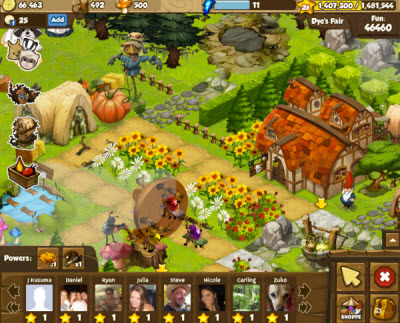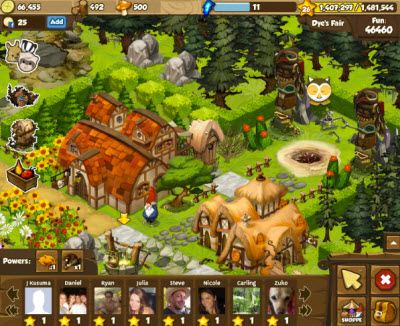 LOLapps got knocked for a loop last month when Facebook abruptly shut down all of the company’s apps, which collectively draw more than 100 million monthly active users. So perhaps its no surprise to see today that the company is moving beyond Facebook.
LOLapps got knocked for a loop last month when Facebook abruptly shut down all of the company’s apps, which collectively draw more than 100 million monthly active users. So perhaps its no surprise to see today that the company is moving beyond Facebook.
San Francisco-based LOLapps has launched its RavenwoodFair.com website, where users of its popular Facebook game can play. The new game website still taps a user’s friend list via Facebook Connect, but the game can now be played whether a user visits Facebook or not.
It’s similar to a move that Zynga, the largest social-games maker, pulled with its popular FarmVille game, introducing the FarmVille.com website. That launch occurred in the midst of tense negotiations over the social network’s plans to get a cut of virtual goods sold through games played on Facebook.
Arjun Sethi, chief executive of LOLapps, is much too diplomatic to say his company is diversifying away from Facebook. Rather, he says his company is embracing Facebook Connect, which connects your friend lists on Facebook with applications beyond the borders of Facebook’s own social network.
“We have always planned to add new platforms and this game has grown so fast that we have decided to accelerate our plan,” Sethi said.
Zynga has also had feuds with Facebook over the social network’s decision to make it more difficult for users to solicit friends to play their games through status updates and requests, which forced big game companies to pay for more advertising to spread their games.
 Ravenwood Fair is a good candidate for LOLapps to use to move beyond Facebook because it’s a big hit. Developed by consultant John Romero, co-creator of Doom, the game has grown to more than 1.8 million monthly active users in just two weeks, according to AppData.
Ravenwood Fair is a good candidate for LOLapps to use to move beyond Facebook because it’s a big hit. Developed by consultant John Romero, co-creator of Doom, the game has grown to more than 1.8 million monthly active users in just two weeks, according to AppData.
The average session time for the game is more than 20 minutes and as many as 12 percent of users are purchasing items in the game, Sethi said. Sethi believes that the number of users buying virtual goods is high because the game makes use of Facebook Credits, the new official virtual currency for the social network.
The interesting thing about launching the website with Facebook Connect is that the game allows players to log in into their own game — with all of its saved data — from anywhere. You can go to the Facebook site or you can go to the web site and still play the same game with your same saved data and character.
Things are going well now, but Ravenwood Fair was almost derailed. It was supposed to launch on Oct. 15, but Facebook pulled down all LOLapps games on that day and didn’t restore them until the evening of 17, citing only “violation of Facebook’s policies.” The Wall Street Journal reported that some games, including LOLapps titles, were wrongfully transmitting user data to third-party companies. Of those companies, LOLapps was one that was singled out and shut down. Sethi said LOLapps worked with Facebook to restore its games and will ensure it can protect users’ safety and abide by Facebook’s policies. By Tuesday, Oct. 19, LOLapps was able to launch Ravenwood Fair on Facebook.
At the time, Sethi didn’t comment on being in the penalty box with Facebook. But in a blog post, the company acknowledged that Facebook said that, “in most cases, developers did not intend to pass this (private user) information, but did so because of the technical details of how browsers work.” Upon learning of the problem, LOLapps “immediately dissolved” a relationship (presumably a business deal with RapLeaf, one of the marketing firms caught in the privacy mistake) and then brought itself back into compliance.
The whole incident showed everyone that LOLapps’ fate lay entirely in Facebook’s hands. When its games were taken down, LOLapps had no games available at all. Diversification was an obvious strategy to pursue.
Ravenwood Fair is part of LOLapps’ strategy to become a big player in social games and join the ranks of Zynga, EA-Playfish, Disney-Playdom, and CrowdStar. Those companies have been printing money by creating simple casual games that are free-to-play, where users can play the game for free and can pay real money for virtual goods.
AppData shows that LOLapps has more than 15 million monthly active users on Facebook. But LOLapps says Facebook does not include in those stats the company’s many users who have developed their own custom gift and quiz apps using LOLapps titles.
VentureBeat's mission is to be a digital town square for technical decision-makers to gain knowledge about transformative enterprise technology and transact. Learn More
